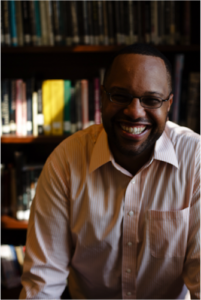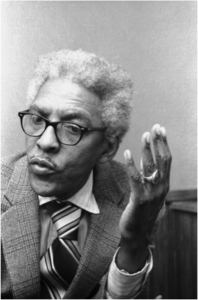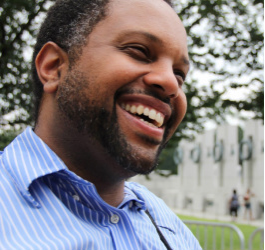Washington, DC is about as far away culturally from Hollywood as one can get in this country. However, for New York Film Academy (NYFA) Screenwriting and Liberal Arts & Sciences (LAS) instructor Terah Jackson, his hometown (DC, not Hollywood) provides a wealth of experience to draw upon. 
Jackson doesn’t just write politically-minded movies, but also mixes genres such as science fiction to—as he says—“add some Hollywood flair.” A director and writer of both stage and screen, Jackson has trained at Lincoln Center and worked off-Broadway. He’s also won awards and garnered attention from the WGAW, Nicholls, Film Independent, and Sundance.
Currently, Jackson teaches NYFA classes such as Playwriting and Great Playwrights as well as courses like Genre Studies and Writing the Feature Film. He took some time from his busy schedule to discuss Washington, DC, his career, and his civic responsibility as an artist—based on his ties to the civil rights movement.
New York Film Academy (NYFA): How did you discover theatre?
Terah Jackson (TJ): You mean outside of holiday kindergarten pageants, where I was an outstanding Tree #3?
I’d say it began with my mother. She’s a master storyteller and as a child I’d follow her around to different storytelling gigs like Three Stories Tall, the first show on NBC4’s 1980s Saturday Morning lineup. She would ask me how she did, and I would give her my notes on her performance and story structure. In time she grew to appreciate it—I think! Those experiences shaped who I am as an artist and storyteller today.
NYFA: How did your experiences in Washington, DC influence your writing? Do politics—local or national—inform the themes and issues you explore?
TJ: Growing up in Washington, DC was, for me, a tale of two cities. There’s Washington—the stuff of The West Wing—then there’s DC, which at times resembles The Wire (which is set in Baltimore). While my neighborhood had its own international gangs, I took the E2 bus line to schools that daughters of diplomats might attend. It was a good life, but confusing crisscrossing cultural and class divides. My sci-fi thrillers, political period pieces, and comedies speak to these experiences.
But if you mean more directly “does working in the Pentagon and youth detention centers show up on the page?” Yes, absolutely. To me, working in Hollywood is like DC, but with flair. Take what I did in the DC government, working on adult education and special needs services, dress it up with a little flair like invading aliens posing as lobbyists, and there you g—that’s my sci-fi thriller, Primrose. The customs are different, but the work, the negotiations, and the characters are strikingly similar. There has to be a demand to make a deal.
NYFA: Your parents were in the civil rights movement. Can you talk about that—and how that also influenced and shaped you?

TJ: Yes, both my parents were civil rights activists at Howard University and in the city at-large. As the child of civil rights activists, it’s important to me that my work carries forward the spirit of what they fought for—even if it is sci-fi or comedic—that it carries a sense of human dignity. Their work is unfinished. The struggle continues.
As an artist I have a civic responsibility to amplify or envision the kind of future we all deserve. It’s an important role to reflect and shape culture as well as one’s sense of self within society. We don’t often discuss it, but Harry Belafonte, Maya Angelou, Sammy Davis Jr., Lorraine Hansberry, and Marlon Brando in their own ways and to varying degrees were influential to making events like the March on Washington what they were. When you look at their artwork they often speak to human dignity and the betterment of society.
NYFA: Any projects of yours you’d like to highlight?
Rustin, a feature, probably is the project that honors my parents and their generation the most. It started at AFI as my thesis and was developed further at Film Independent and with support from the WGAW. It’s about Martin Luther King, Jr.’s strategic advisor Bayard Rustin, who is pushed out of the civil rights movement because he’s gay. But when he returns, he organizes the March on Washington of 1963. It honors the work of Bayard and the civil rights movement and hopefully reminds us to keep on working for a truly inclusive and equitable society.
NYFA: What are you currently working on?
TJ: Quite a few projects, but today it’s all about Displaced, a sci-fi pilot, about a lowly janitor who finds he’s receiving pranks calls from inside his bedroom wall from a phone on his own dead body—or at least someone who looks identical to him. Without giving too much away it’s a bit of a doppelganger thriller that I’ve been developing over the past year or so alongside a few other concepts for TV that I can’t talk about yet. Displaced definitely draws on my experience growing up asking those “What if” questions.
NYFA: What are your favorite classes to teach at NYFA and why?
TJ: My favorite class to teach at NYFA are the ones when a good mix of students from across the world—from various ages, ethnicities, classes, and those with military experience and those without—are all in the same room together investigating a deep tenet of writing or film that reflects what we are up to in life. In that moment we all learn from each other. It’s dynamic, electric, and enriches everyone.
NYFA: What advice do you have for students looking to get into playwriting?
Take risks that you wouldn’t in film and television. Read and see lots of plays. Act in plays. Seek to understand the mechanics of how they are structured. And write, write, write. Develop your writing routine. Connect with other playwrights. Go outside and listen to people and how they speak. Jot down moments of striking human interaction. Piece them together. Theatre often calls for you to dig deep into yourself. So take care of your relationships, spirit, and your health as you do all this. This is a marathon, not a sprint.
New York Film Academy thanks Screenwriting and LAS instructor Terah Jackson for taking the time to speak with us and wishes him the best in all his creative endeavors.